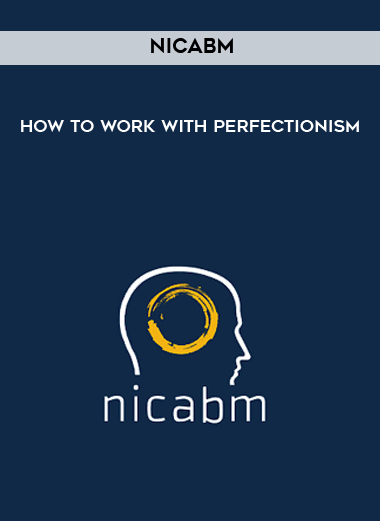NICABM – How to Work with Perfectionism
$197.00 Original price was: $197.00.$45.00Current price is: $45.00.
Proof of item:

erfectionism can lock a client in a constant state of anxiety, grinding down their nervous system.
It can lead to depression, chronic stress, and become a painful coping strategy for shame.
So how do we help clients achieve their goals without the harsh self-critical drive that’s impacting their health and damaging their relationships?
We gathered the latest strategies from the top 26 experts in the world for this brand new course . . .
How to Work with a Client’s Perfectionism
The Neurobiology of Perfectionism
Dan Siegel, MD Kelly McGonigal, PhD
- A mapping framework to help clients identify perfectionism patterns in the brain
- What goes on in a perfectionist’s brain and how it can create a self-made prison
- Why a perfectionist’s brain is highly optimized for detecting error
Perfectionism’s Cost: Helping Clients See the Hidden Damage Under Perfection’s Rewards
Deany Laliotis, LICSW Melanie Greenberg, PhD
Stan Tatkin, PsyD, MFT Zindel Segal, PhD
Judson Brewer, MD, PhD Kelly McGonigal, PhD
- The most powerful driver of perfectionism (and why clients so desperately cling to it)
- Why your client will often reject the idea that perfectionism is hurting them
- Two toxic factors that can set a perfectionist up for depression
- Why perfectionism so often presents with disrupted sleep
Why Perfectionism Turns to Addiction and How to Help Clients Break Free
Judson Brewer, MD, PhD Ron Siegel, PsyD
Michael Yapko, PhD Joan Borysenko, PhD
- The addiction pattern that keeps many clients locked in a drive for perfection
- The perfectionist paradox: one way perfectionism actually promotes failure
- A core missing skill that can keep a client addicted to perfection
How to Work With Shame and Perfectionism
Pat Ogden, PhD Ron Siegel, PsyD Deany Laliotis, LICSW
Richard Schwartz, PhD Melanie Greenberg, PhD Rick Hanson, PhD
- How perfectionism helps fuel a person’s feeling of “never good enough”
- One powerful strategy to foster the inner compassion that can reduce shame
- A body-centered approach for working with the painful feelings beneath perfectionism
- How to defuse an inner critic that’s driving your client’s perfectionism
How to Work with Clients Paralyzed by Their Perfectionism
Shelly Harrell, PhD Steven Hayes, PhD Ron Siegel, PsyD
- Why your client’s procrastination might be a hidden form of perfectionism
- How perfectionism can shift clients from motivation to paralysis
- The critical cost to a client who suffers perfection-driven paralysis
How to Target Perfectionism That’s Stuck in the Nervous System
Stephen Porges, PhD Bonnie Goldstein, LCSW, EDM, PhD
Deb Dana, LCSW
- How to help clients listen to the story their nervous system is telling them
- The crucial link between perfectionism and early life attachment
- The core vulnerability that can lead to an obsession with perfection
- How the nervous system can trap a person in a perfection-isolation loop
How to Work with Perfectionism That’s Linked to Trauma
Resmaa Menakem MSW, LICSW, SEP Onno van der Hart, PhD
Ron Siegel, PsyD
- How trauma strengthens the one core element that gives perfectionism its power
- Why trauma-driven perfectionism can often be mis-assessed as a personality trait
Key Strategies for Working with Obsessive Compulsive Disorder and Perfectionism
Pat Ogden, PhD Bill O’Hanlon, LMFT
- How to help clients manage the OCD that’s keeping their perfectionism alive
- A bottom-up approach to treating hyperarousal triggered by perfectionism
- One technique to help a perfectionist safely experience mistakes
How to Help Clients Shift a Rigid Perfectionist Mindset
Zindel Segal, PhD Lynn Lyons, LICSW Michael Yapko, PhD
- One crucial reason a client will hold onto perfectionism (even when it’s costing them)
- How to help clients soften their rigid perfectionistic boundaries
- How an overachiever will often assess imperfection (and why this keeps them stuck)
1 review for NICABM – How to Work with Perfectionism
Sorry, no reviews match your current selections
Q & A
Ask a question
Your question will be answered by a store representative or other customers.
Thank you for the question!
Your question has been received and will be answered soon. Please do not submit the same question again.
Error
An error occurred when saving your question. Please report it to the website administrator. Additional information:
Add an answer
Thank you for the answer!
Your answer has been received and will be published soon. Please do not submit the same answer again.
Error
An error occurred when saving your answer. Please report it to the website administrator. Additional information:
Related products
NLP & Hypnosis
NLP & Hypnosis
NLP & Hypnosis
NLP & Hypnosis
NLP & Hypnosis
NLP & Hypnosis
NLP & Hypnosis












![Kali Dubois – Forbidden (Banned) Patterns Brainwashing for Submissive Advanced Mental Strategies [DVDRip – 6 MP4s x265]](https://coursehope.net/wp-content/uploads/2021/01/kali-dubois-forbidden-banned-patterns-300x400.jpg)
good thank you | NICABM – How to Work with Perfectionism